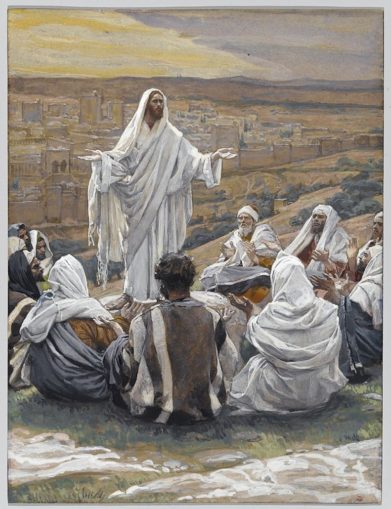
James Tissot, Public domain, via Wikimedia Commons
My Own Interpretation
The Lord’s Prayer
Our Father, who art in heaven,
hallowed be thy name;
thy kingdom come;
thy will be done;
on earth as it is in heaven.
Give us this day our daily bread.
And forgive us our debts,
as we forgive our debtors
And lead us not into temptation;
but deliver us from evil.
For thine is the kingdom,
the power and the glory,
for ever.Amen.
First of all, let me state, that I am no theologian. I was brought up in a fairly religious Church of Scotland family in Dundee. My father went to church every Sunday, was involved in all sorts of church based activities and in later life was a lay reader. My mother, looking after four children had little time to attend church, Sunday was the clothes washing day. The Hotpoint twin tub was brought out into the middle of the kitchen floor and was in action most of the day.
My brothers, sister and I all attended Sunday school at varying times. One part of it, and, to the best of my knowledge, most religious ceremonies is the Lord’s Prayer. We all know the words, but how many of us have ever stopped to think what they mean.
I learned the Lord’s Prayer at primary school by rote. We would all sit and chant it mechanically until we had it word perfect and could recite it at the religious service every Friday morning at school. A minister would come in give us a short sermon and we would sing a hymn and say the Lord’s Prayer.
The version we learned in Scotland replaces trespass and trespassers with debts and debtors.
Fast forward nearly sixty years to last December when I was in Winchester Cathedral for a Christmas service, we were reciting the Lord’s Prayer when I got to thinking, what do all these words mean. We say them without thinking because that was how we were taught them. Just to say them and never any explanation given or expected.
The Lord’s Prayer is taken from Matthew Chapter 6 verses 8 to 13, and Matthew attributes the words as said directly by Jesus
My interpretation is below. It may be right, it may be wrong, but it is the Lord’s Prayer as I see it. I suspect that like all thing religious you can read whatever meaning you want from it.
***
Our Father, who art in heaven,
hallowed be thy name;
thy kingdom come;
thy will be done;
on earth as it is in heaven.
The first part is proclaiming God in heaven and all around. Then replace “Thy” with “God” or “Gods” and the next two lines start to make sense. That by following God’s will and Jesus’s teachings on Earth you will eventually enter the Kingdom of Heaven.
Give us this day our daily bread.
And forgive us our debts,
as we forgive our debtors
This next section I interpret to be asking for God to help provide for us both spiritually and physically. Give us something that will nourish us both in mind and body.
For “Debts” I have always taken this as anything we have done that may affect someone else and “Debtors” to be us forgiving anyone who has done anything to us.
And lead us not into temptation;
but deliver us from evil.
For thine is the kingdom,
the power and the glory,
for ever.
The final part is a plea for protection and salvation, followed by the praising of God who is all powerful.
I personally think there should be and additional “and ever” on the last line to help the flo of the words. I add it whenever I say the prayer.
As I said earlier, this is my interpretation and may not be what other people take from it, but I think it is something that is individual.
I hope it makes you think next time you are at a wedding, funeral, Christening, at a Sunday service or praying wherever you are what the words you learnt, but may not have understood, all these years ago are actually saying.
© 10210ken 2022



